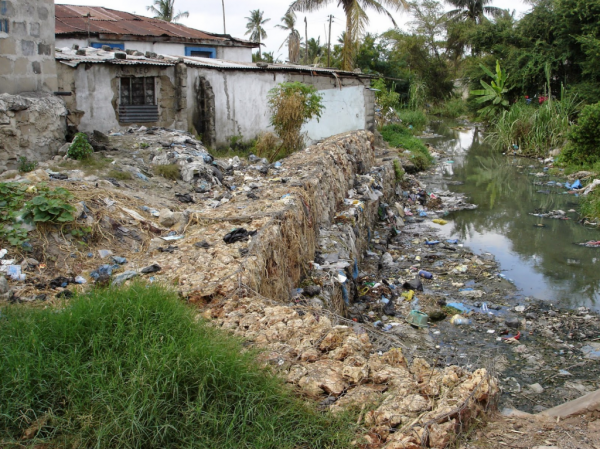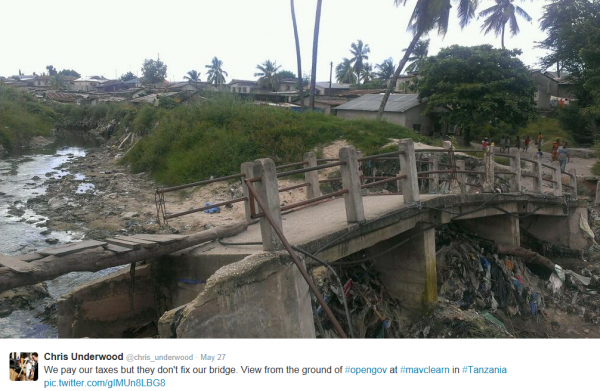The following is written by Chris Underwood on the challenge and opportunity of connecting citizens and government.
“Trust the people who sold my future?” Amina had just been asked what it would take for her to start to engage with the State, in this case local government, in this part of Dar es Salaam. The 30 year old mother of three was responding to one of our group, visiting as part of a Making All Voices Count field trip intended to ground our Learning & Inspiration Week in hard reality. Amina replied that these were the same local authorities that included an education official who had sold her place at college to a politically better-connected student. When she turned up to enrol she found her future as a nurse had been traded away, and with it her chance to escape the cycle of poverty in the slum area in which she’d grown up.
Amina’s experience, which also included regularly having to pay increased “taxes” for services that either didn’t exist or never materialised after elections, is the norm in this community. Dar es Salaam is already experiencing the effects of climate change and this area, near the heavily polluted river, is flooded several times a year. Sad piles of ineffective home-made sand bags, together with slime markers on the walls, are silent testament to the lack of support they have received from any element of the State for that too. And symbolically standing over the river, which doubles as the local latrine, was the bridge connecting the two halves of the community. A flood from well over a year ago had broken the structure, and locals had erected a precarious plank based link to the remaining parts of it. Countless promises have been made to fix it, taxes even raised using it as a justification. But still the bridge remains broken.
Amina, who assists an alternative health practitioner used by people who cannot afford to use the local hospital, or to purchase drugs that are frequently only available on the black market, summed it up: the only part of the State that actually works is the tax system. They are very efficient at taking your money.
This is the uncompromising reality of people’s lives. Even if genuine reforms to the way the State interacts and thinks about its citizens started tomorrow it would take generations to turn around the perceptions and expectations of people for whom ‘government’ means predation. So what does that mean for governance reform initiatives like Making All Voices Count?
Perceptions, power and people
Institutions do not rest on technical ‘capacity’, they rest on how they are perceived. Yet donor initiatives frequently fail to recognise this and risk exacerbating the problem. The State exists through institutions. But when those institutions have lost legitimacy in the eyes of the people the answer is not simply to press on with ‘capacity building’ initiatives regardless. Yet this has been precisely the approach of so many ‘state building’ approaches in the last decades. Making the Ministry of Finance more efficient at tax collection is not likely to re-engage Amina. And a view of the State from a Western perspective with strict divisions between the public and private spheres is also likely to fall short, because this is simply not the reality of people’s lives. This has been pointed out for decades, with Douglass North in 1990 re-casting the idea of State institutions as being both formal and informal means of setting:
…the rules of the game in a society or more formally … the humanly devised constraints that shape human interaction.
He meant that the State is more than the formal boundaries of institutions with their rules based systems, but the human norms and power assymetries that they encourage. If the rules of the game are stacked against you and the use of power by officials is predatory, then simply building capacity without fundamentally reforming those institutions is likely to make progress less, not more likely.
Sadly many ‘state building’ approaches only do the capacity building part, not the more politically awkward reform. The OECD recently produced work which underlines further the power of perceptions:
Lack of legitimacy contributes to state fragility by undermining the processes of state-society bargaining that are central to building state capacity.
And it is that bargaining which needs to happen; donors ignore this complexity at their peril:
All donor interventions affect local political processes, and thus state capacity and legitimacy.
Humility: change takes time & short-termism is harmful
If we accept that the institutions through which the State and citizen conduct their bargaining are more than their tangible parts but include the intangible norms, behaviours and perceived levels of legitimacy, then we must also accept that changing these dynamics takes time. As Jonathan Fox asked during the TALearn week in Indonesia earlier this year: which theory of change had ever proven that you could overturn centuries of power dynamics by the application of a time-bound technocratic project?
The question was of course rhetorical, and reflective of a key conclusion reached by the World Development Report of 2011, produced by that bastion of technocratic short termist approaches the World Bank, which reached the stark conclusion that such change took around 30 years to evolve.
That is not an argument for 30 yearlong projects but it is a warning light to initiatives to avoid short termism in favour of longer term commitments and for short life-span initiatives to have the humility to think about where in that continuum of change they might sit, and design their contributions accordingly.
Innovation is critical, but so is context
Does all this mean global initiatives, with short life-spans and focused on the use of innovation are doomed to fail? No. I would argue that the literature on the role of Positive Deviance and suggestions of Problem Driven Iterative Adaptation point to a different way of conceiving the change we might be looking for and the way we design our approaches to supporting it.
Positive Deviance, the idea that local innovators find new ways of going outside norms to solve a problem, emerged as a theory in the in the early 1990s and has since led to more thinking about how to encourage it. There is a continuing debate about whether that change happens more because of strong local leaders driving it forward, or a more problem-driven approach that responds to change and flexibly adapts, but both schools of thought agree that local leadership is critical. Without it, this change simply does not happen. Which means that achieving a global vision can only ever work if it is pursued from the bottom up rather than imposed from the top down.
Making All Voices Count
Adapting to what you learn makes perfect logical sense but it does not always survive the power of the dreaded logframe. What NGO is going to have an open conversation about how they may have failed in front of the people they rely on for future funding when they think those funders will respond to failure – any failure – negatively. Yet it only takes a cursory look at any donor record to realise that failing is a perfectly normal outcome, just as any look at human experience in facing up to problems includes trial and error.
About the author
Chris Underwood is Director of Country Programmes at Making All Voices CountRelated content
-
PUBLICATION | November 21, 2014
Bridging and bonding: improving links between accountability actors -
BLOG | January 29, 2014
From ‘feedback loops’ to ‘responsive governance’ -
BLOG | February 9, 2015
Can chaos and collision lead to co-creation of innovative ideas? -
BLOG | July 22, 2014
Open knowledge and changing the world

